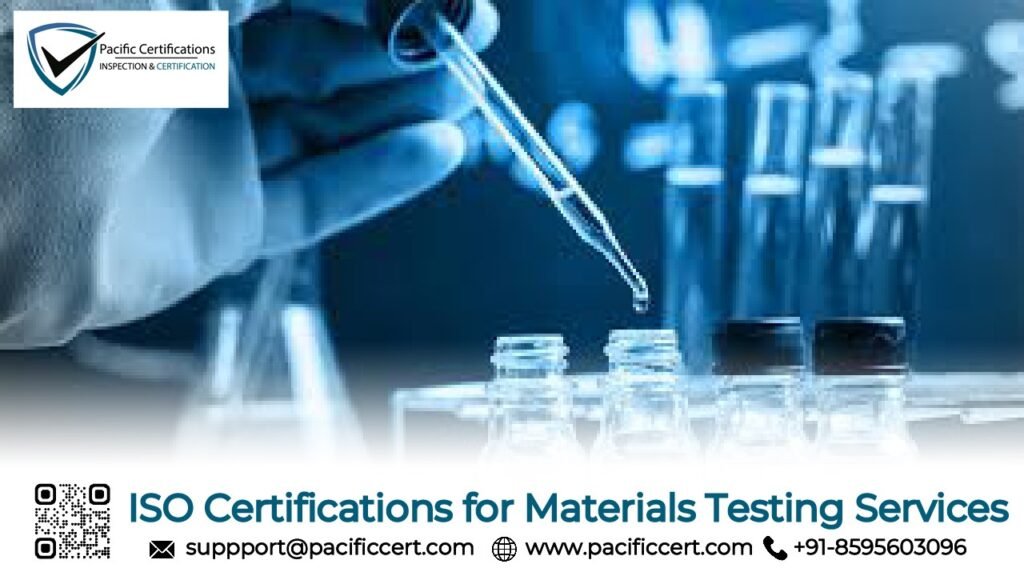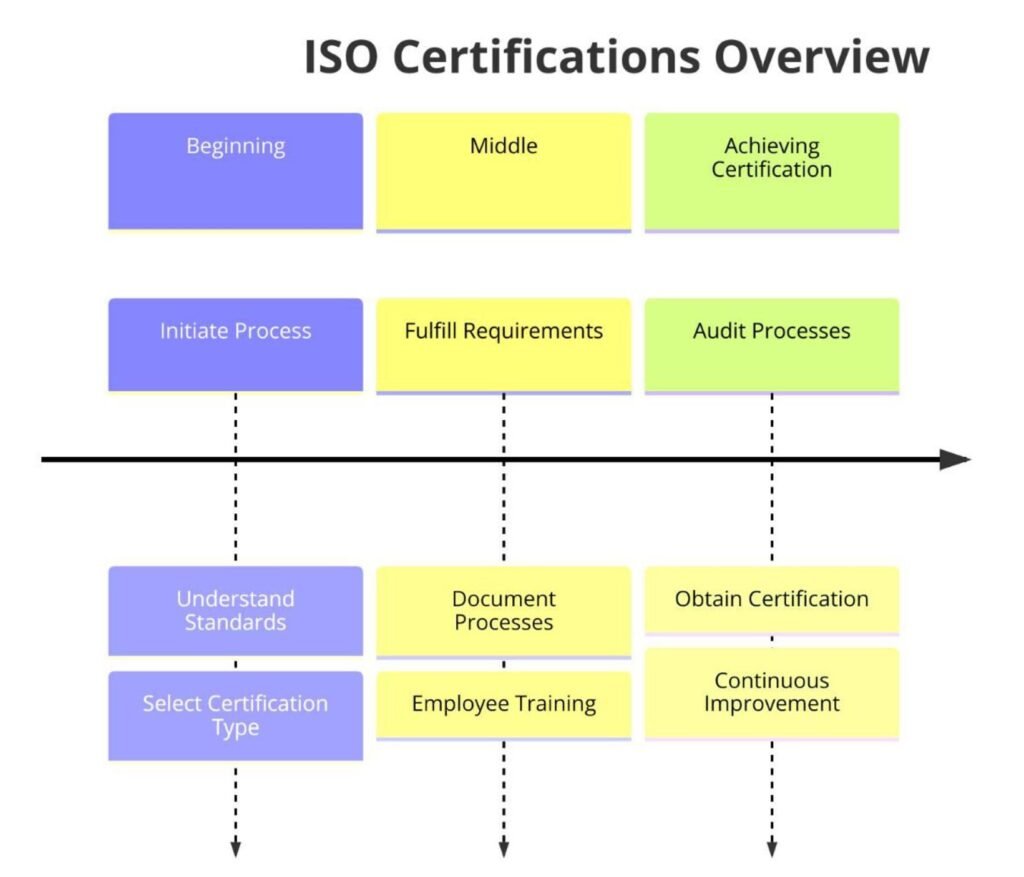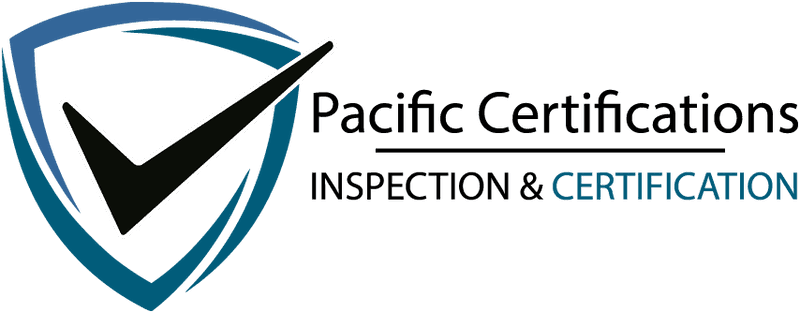
ISO Certifications for Materials Testing Services Businesses, Requirements and Benefits
Materials testing services play a critical role in industries like construction, manufacturing, automotive, aerospace etc. These services ensure that materials used in various applications meet rigorous safety and performance requirements. But how do organizations establish trust and prove that their testing methods are reliable and globally recognised? The answer lies in ISO standards.
International Organization for Standardisation develops globally accepted standards that set benchmarks for quality, safety & consistency. These standards ensure that materials testing laboratories operate at the highest level of competence, impartiality and consistency. By implementing ISO standards, organisations can provide assurance to their clients and stakeholders that their results are accurate and meet international requirements.

Whether you’re conducting mechanical tests on metals, chemical analyses of polymers, or environmental durability testing, ISO certifications create a framework for delivering reliable services. With increasing global demand for high-quality materials testing, ISO-certified organizations are better positioned to thrive in global markets.
If you’re looking for ISO certification for Materials Testing Services, reach out to us at support@pacificcert.com or call us at +91-8595603096 for expert assistance.
Applicable ISO Standards for Materials Testing Services
Materials testing services cover a wide range of industries and testing methods, which is why multiple ISO standards apply to ensure specific requirements are met. Below are some of the most relevant ISO certifications for materials testing services:
ISO/IEC 17025: General Requirements for the Competence of Testing and Calibration Laboratories: ISO/IEC 17025 is the most widely recognized standard for testing and calibration laboratories. It specifies requirements for technical competence, management systems, and impartiality. Laboratories accredited to this standard can prove their ability to produce valid, precise results.
ISO 9001: Quality Management Systems: ISO 9001 establishes a quality management framework that ensures consistency and customer satisfaction. Materials testing labs certified to ISO 9001 demonstrate their commitment to maintaining quality processes and improving client experiences.
ISO 45001: Occupational Health and Safety Management Systems: Safety is crucial in materials testing laboratories where hazardous chemicals, heavy equipment, and high-pressure systems are commonly used. ISO 45001 ensures that organizations maintain safe working environments, reducing risks to employees and preventing accidents.
ISO 14001: Environmental Management Systems: Sustainability is a growing concern across all industries. ISO 14001 certification helps materials testing laboratories minimize their environmental footprint by managing waste, reducing emissions, and improving resource efficiency.
ISO 50001: Energy Management Systems: For laboratories with energy-intensive operations, ISO 50001 offers a framework to enhance energy efficiency, reduce costs, and demonstrate a commitment to sustainable practices.
ISO 37301: Compliance Management Systems: This standard provides guidance for implementing effective compliance management systems in materials testing organizations. It ensures that laboratories meet legal, regulatory, and ethical obligations.
ISO 15189: Medical Laboratories – Requirements for Quality and Competence: Although primarily intended for medical laboratories, ISO 15189 can also be relevant for materials testing in healthcare-related industries, such as biomaterials or medical device testing.
Industry-Specific Standards: In addition to the general ISO standards, some industries may have specific requirements. For example, aerospace companies often require compliance with AS9100 (based on ISO 9001), while the automotive sector may look for compliance with IATF 16949.
Click here to find out more applicable standards to your industry
Pacific Certifications is a globally recognized certification body specializing in audits and ISO certification issuance. For organizations looking to obtain ISO certifications for materials testing services, we provide an end-to-end certification process with a focus on accuracy, reliability, and compliance.
With us, your organization gains access to an experienced team of auditors with in-depth knowledge of materials testing standards. Our thorough audit process evaluates your systems and procedures to ensure compliance with the applicable ISO standards. Upon successful completion of the audit, we issue your ISO certification, demonstrating your commitment to quality and competence.
Pacific Certifications is committed to providing impartial and professional certification services. Whether you are seeking ISO/IEC 17025, ISO 9001 certification, or other relevant standards, our team ensures a smooth and transparent certification process.
For ISO certification tailored to Materials Testing Services, email us at support@pacificcert.com or speak to our team at +91-8595603096.
Requirements of ISO Certifications for Materials Testing Services
Obtaining ISO certification for materials testing services involves meeting specific requirements. Here are some of the key areas that laboratories need to focus on:

ISO/IEC 17025
- Competence of personnel performing testing or calibration.
- Valid calibration and maintenance of equipment.
- Documented quality management system.
- Traceability of measurement standards.
- Clear procedures for impartiality and confidentiality.
ISO 9001
- Establishment of a quality management system (QMS).
- Focus on customer satisfaction and continuous improvement.
- Risk-based thinking for operational processes.
- Clear roles and responsibilities.
- Performance monitoring and internal audits.
ISO 45001
- Identification and management of occupational health and safety risks.
- Clear safety policies and procedures.
- Employee participation in safety management.
- Incident reporting and corrective actions.
ISO 14001
- Implementation of an environmental management system (EMS).
- Identification and control of environmental impacts.
- Regulatory compliance and sustainability initiatives.
- Continual improvement in resource efficiency.
ISO 50001
- Development of an energy management system.
- Monitoring and reduction of energy consumption.
- Setting energy efficiency objectives and action plans.
- Integration with operational processes for sustainability.
ISO 37301
- Establishing a compliance management framework.
- Ensuring adherence to legal and regulatory requirements.
- Mitigation of compliance risks and ethical breaches.
- Monitoring and auditing of compliance effectiveness.
ISO 15189
- Focus on quality and competence for medical or healthcare testing.
- Validation of testing procedures and methods.
- Staff qualifications and continual training.
- Assurance of result accuracy and reliability.
Each standard serves a unique purpose but collectively ensures operational excellence and compliance for materials testing services.
Get in touch for ISO certification for Materials Testing Services at support@pacificcert.com or give us a call at +91-8595603096 today.
Benefits of ISO Certifications for Materials Testing Services
Achieving ISO certification offers a wide range of benefits for materials testing laboratories:

Credibility: ISO certification is a globally recognized mark of quality and competence. It enhances the credibility of your laboratory and builds trust with clients, partners, and stakeholders.
Efficiency: By following ISO standards, laboratories can streamline processes, reduce waste, and improve overall efficiency. This leads to cost savings and higher productivity.
Compliance: Many industries require ISO-certified testing as part of their regulatory compliance. Certification ensures that your laboratory meets legal and industry-specific requirements.
Access to Global Markets: ISO certification enables your laboratory to operate on a global scale by meeting international standards. This is especially beneficial for organizations that work with multinational clients.
Customer Satisfaction: Reliable, accurate testing results lead to higher customer satisfaction and repeat business. ISO-certified laboratories are better positioned to meet client expectations.
Reduced Risks: ISO standards emphasize risk management and continual improvement, helping laboratories identify potential issues before they become significant problems.
As of 2025, the materials testing industry is experiencing rapid growth due to increasing demand for sustainable and advanced materials across various sectors. Innovations in materials science, such as graphene and bioplastics, are driving the need for specialized testing services. Additionally, global supply chain disruptions have led to a stronger emphasis on quality assurance and certification.
According to industry reports, the global materials testing market is expected to grow at a CAGR of 5.8% over the next five years. ISO-certified laboratories are poised to benefit from this trend as companies prioritize working with accredited partners.
Ready to take your materials testing services to the next level? Whether you need ISO 17025, ISO 9001, or other relevant standards, we are here to help. Contact us today!
Pacific Certifications is accredited by ABIS, in case you need support with ISO certification for your Materials Testing Services business, please contact us at support@pacificcert.com or +91-8595603096.
FAQs: ISO Certifications for Materials Testing Services
ISO/IEC 17025 is the gold standard for testing and calibration laboratories. It ensures that a laboratory is technically competent and produces reliable, accurate test results.
The most relevant certifications include ISO/IEC 17025, ISO 9001, ISO 45001, and ISO 14001. Specific certifications may vary depending on the industry and type of testing conducted.
The timeline for certification depends on the size and complexity of your organization. Typically, the process takes several weeks to a few months.
Yes, Pacific Certifications specializes in auditing and issuing ISO certifications for materials testing services. We ensure a seamless certification process.
ISO certification enhances credibility, improves operational efficiency, ensures regulatory compliance, and provides access to global markets.
You can reach us at support@pacificcert.com for inquiries, scheduling, or further assistance.
Read More at: Blogs by Pacific Certifications






